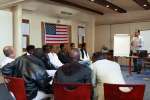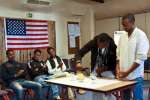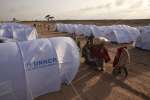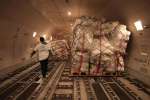UNHCR strives to find solutions for refugees at Egypt-Libya border
News Stories, 21 May 2012
SALLUM, Egypt, May 21 (UNHCR) – Andrew Mok, computer open in front of him, faced the Sudanese man across the table in a converted freight container and began the interview.
"Please do not make any false statements because that could have a negative impact on your application," the 23-year-old from Hong Kong informed the man, who was bidding to be recognized as a refugee. "Everything you tell UNHCR will be strictly confidential," he added, reassuringly.
Refugee status determination (RSD) is a vital part of UNHCR's daily protection work and the above scene is replicated every day in UNHCR operations around the world.
But there is a difference at Sallum because those being interviewed are stuck at a busy border crossing, unable or unwilling to go home or back to Libya, and not allowed to go further inside Egypt. There are around 2,000 people left from the 40,000 third country nationals who fled to Sallum to escape last year's conflict in Libya, most of whom were allowed to transit Egypt.
"All of them want to leave [for resettlement]," Yvan Sturm, head of UNHCR's Sallum team, said of the 2,000. ''The majority have no other option," added Stephen Choka, the RSD supervisor. The best solution for refugees is normally repatriation followed by local integration, but at Sallum everyone registered as a refugee has been referred for resettlement – this does not apply to those who have arrived since a cut-off date last October.
Although both the Egyptian border authorities at Sallum and UNHCR want to see the problem resolved soon, the process takes time. Mok was interviewing the Sudanese man for the third time, asking about an inconsistency that could mean the difference between recognition as a refugee and rejection. And resettlement can only be considered for recognized refugees.
Today, the work of the refugee agency's RSD team at Sallum, many of whom were seconded from the Danish Refugee Council, is almost finished and Andrew has already left. A total of 1,750 people, mostly from Sudan, have been registered as refugees, of whom 248 have to date departed for resettlement countries or for transit centres in Europe.
Sixty cases were rejected for refugee status, even after appeal, while more than 200 people who arrived in Sallum after October 23 have been told they will not be considered for resettlement. The decision to impose a cut-off date was aimed, in part, at deterring people who were neither residents of Libya nor affected by the conflict there from heading to the border. "The people who came after this date are considered as asylum-seekers, but will not be interviewed for RSD," Sturm said.
While the RSD process is almost over, it will take many more months before all of those referred for resettlement finally get to leave for their new homes. That's partly because "only six resettlement countries have taken cases from Sallum," said Heidi Boener. "We are heavily dependent on the United States," added the resettlement officer.
As Mok continued with his questions, Boener stood in a nearby building and addressed about 30 registered refugees from Eritrea, Somalia and Ethiopia who were due to be interviewed over a two-week period by officials from the United States Department of Homeland Security (DHS). She took them through the kinds of questions they would face, including queries about their family history and why they cannot return to their country of origin.
Boener said more than 1,400 people had been referred to the US for resettlement and the visiting DHS staff planned to meet a first group of about 250 for a so-called first circuit interview, with plans to return about every three months to talk to a similar number each time. After interviews, and if they are conditionally approved, they will undergo security background checks and medical screening before final approval and authorization to fly to America.
"It's going to be a few months for the case to move," Boener said, referring to this first group to be interviewed. "It's not going to happen overnight. They take a long processing time," she noted, while adding: "It would be really great if other resettlement countries would consider coming here to share the responsibility."
This was echoed by a senior Egyptian port official, who said the rate of resettlement so far had been slow and he was worried that the problem would linger for years. In addition to the United States, Canada, Denmark, Finland, Norway and Sweden have all accepted smaller numbers of people from Sallum. Switzerland has accepted a small number of people through family sponsor applications.
Meanwhile, those stuck at Sallum are clearly getting fed up. "In this camp, I just feel like I am in prison," said Tahir, a middle-aged man from Sudan's Darfur region whose wife has a niece in Arizona. "I wish to go to a safe place where I can get on with my life like other people in the world."
Habtamush, a 20-year-old Eritrean, said she wanted to go somewhere she would be safe and get an education. "I feel happy and I'm dreaming of a better future," she said before the DHS meeting. She knew that there was always the possibility of rejection and delay, but she stressed: "I am prepared to wait."
By Leo Dobbs in Sallum, Egypt

















































